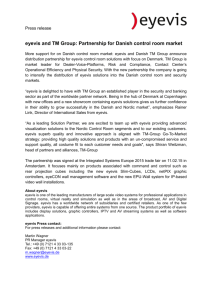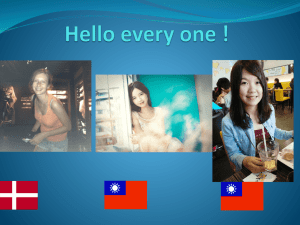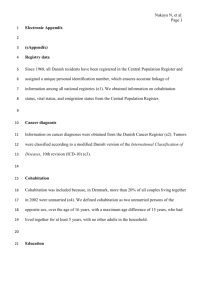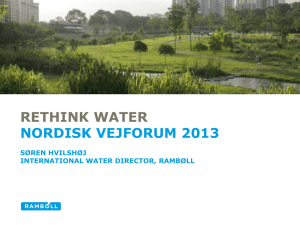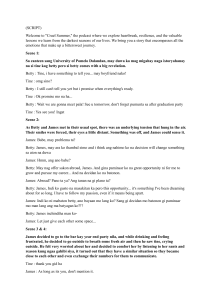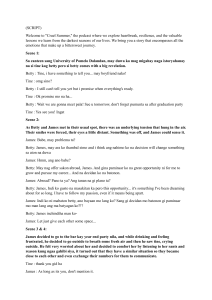Ethnographic Interview Questions
advertisement
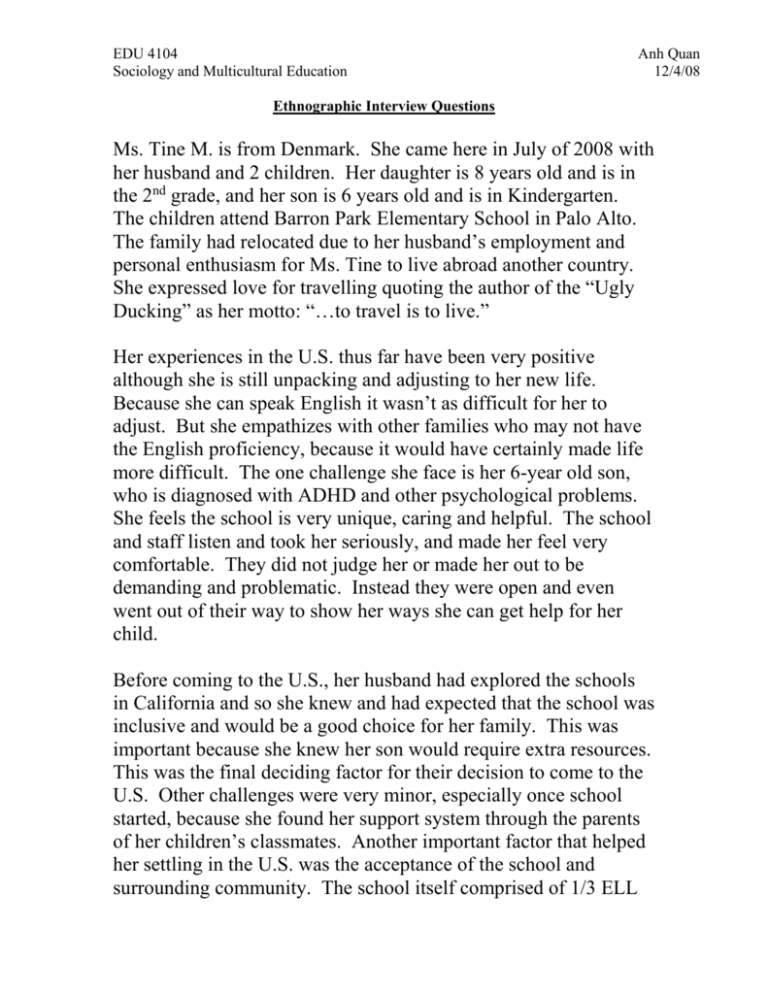
EDU 4104 Sociology and Multicultural Education Anh Quan 12/4/08 Ethnographic Interview Questions Ms. Tine M. is from Denmark. She came here in July of 2008 with her husband and 2 children. Her daughter is 8 years old and is in the 2nd grade, and her son is 6 years old and is in Kindergarten. The children attend Barron Park Elementary School in Palo Alto. The family had relocated due to her husband’s employment and personal enthusiasm for Ms. Tine to live abroad another country. She expressed love for travelling quoting the author of the “Ugly Ducking” as her motto: “…to travel is to live.” Her experiences in the U.S. thus far have been very positive although she is still unpacking and adjusting to her new life. Because she can speak English it wasn’t as difficult for her to adjust. But she empathizes with other families who may not have the English proficiency, because it would have certainly made life more difficult. The one challenge she face is her 6-year old son, who is diagnosed with ADHD and other psychological problems. She feels the school is very unique, caring and helpful. The school and staff listen and took her seriously, and made her feel very comfortable. They did not judge her or made her out to be demanding and problematic. Instead they were open and even went out of their way to show her ways she can get help for her child. Before coming to the U.S., her husband had explored the schools in California and so she knew and had expected that the school was inclusive and would be a good choice for her family. This was important because she knew her son would require extra resources. This was the final deciding factor for their decision to come to the U.S. Other challenges were very minor, especially once school started, because she found her support system through the parents of her children’s classmates. Another important factor that helped her settling in the U.S. was the acceptance of the school and surrounding community. The school itself comprised of 1/3 ELL EDU 4104 Sociology and Multicultural Education Anh Quan 12/4/08 students, which resulted in a huge understanding and acceptance among the community, family and other cultures. Denmark is a Viking-root country with language based on the Scandinavian language. The language of Denmark is Danish and is very similar to that of Norway and Sweden. The written language of the Norwegians can be comprehensible to the Danish, while that of the Swedish would not. Danish are predominantly Lutherans or Protestants in their religious belief. Ms Tine and her family are not religious and do not attend church at all, and hence do not follow the Lutherans or Protestants beliefs. Because Denmark is a country originating from the time of the Vikings, many of the holidays and tradition which they still celebrate are derivatives of the Vikings’ tradition. Another influence was the worshipping or honoring the sun. One of the major holidays for the Danish is the “Sank Hans”, which can be translated as “celebration of the midnight sun.” On this day, they would build a bonfire, usually at the beach, and burn a witch on the broomstick. Back in the days of the Viking, these witches would be the women that the people feared had “super natural” powers and therefore were persecuted in the bonfire. The other significance of this holiday is the honoring of the longest day of the year, which is usually the 21st of June. Another important holiday for the Danish occurs during the “Christmas” time. On the 21st of December, they celebrate the coming back of the sun (which symbolizes light). This is the darkest day of the year and so the consequent days will be longer and longer, hence longer days. During this holiday, they would light lots of candles in joyous celebration. The customs of the Danish is very similar to that of other Westernized countries such as the U.S. There aren’t any notable gender specific roles in or outside the family. The Danish also share similar family values and education emphasis as those of the EDU 4104 Sociology and Multicultural Education Anh Quan 12/4/08 Americans. This had made settling into the American cultures very smooth. And like the U.S. divorces and re-marriages are on the rise. Cases of single parenting are becoming quite common. Such trends led to the creation of the derogative term of “cardboard mother and father” to describe stepparents. Growing up in Denmark was very different. There weren’t a lot of toys. The TV programs were much less than what’s offer nowadays. There was only one channel back then and the only show for children was at 5:30pm weekdays and lasting for only ½ an hour. During the 70’s, the time of gasoline and energy crisis, there was an unspoken fear of a 3rd World War. Everyone had to always remember to turn off the light and not use too much heat. There weren’t many cars on the road as cars back then were very expensive. Most people either walk, bike or took buses. The bus system was very efficient and all the conveniences were very close by, unless you lived in the countryside. There was no such thing as playdates. The children would play with neighborhood friends on the streets. After school activities were available, but the children would choose them and go to them on their own. There wasn’t much attention given to the emotional well-being of the children and thus they were much more independent than children of today. The school system was structured such that K-9 was the primary school which was equivalent to our elementary and middle school combined. The 10-12th grades were called “Gymnasium” and was the equivalent of high school or secondary school. Follow by university. In the primary schools, there was one main teacher who you would be your teacher for the entire time you remain at the school. Then the subject-specific teachers would rotate through the classes to teach the different subjects. Ms. Tine felt that although most of the teachers were nice and decent, there wasn’t any adult or teacher intervention and assistance on the social well-being of the children. Being a quiet and shy girl, she EDU 4104 Sociology and Multicultural Education Anh Quan 12/4/08 was bullied for a very long time. This was also because she was born in Switzerland and did not speak the language very well. Ms. Tine feels that a well-educated child is one that knows the basic knowledge of history, geography, math, science, etc. but follows their heart to explore further the subject of interest. A well-educated child is one who is curious, and does not just memorize facts and information; and who is inspired to follow dreams and actively seek for answers that s/he is curious about- a critical thinker. Ms. Tine has a B.S. degree in Nursing and is a registered nurse. Her husband has a degree almost equivalent to a Masters Degree in Engineering. He’s currently working in sales and not something relating to his degree. Back home, Ms. Tine worked as a nurse in the outpatient, oncology department, doing mostly chemo-therapy. She is currently a homemaker while residing in the U.S. Ms. Tine feels her role and her husband’s role in their children’s education is very important. She works closely with the school and teachers and support school by helping in the classroom and with the homework at home. She guides her children’s curiosity and questions and teaches them more about what they want to know or learn. As there aren’t any complaints on her part about the teachers and staff, because they are (in her own words) “amazing.” She already feels that her family and she are very well embraced by the school, the community and the society.

